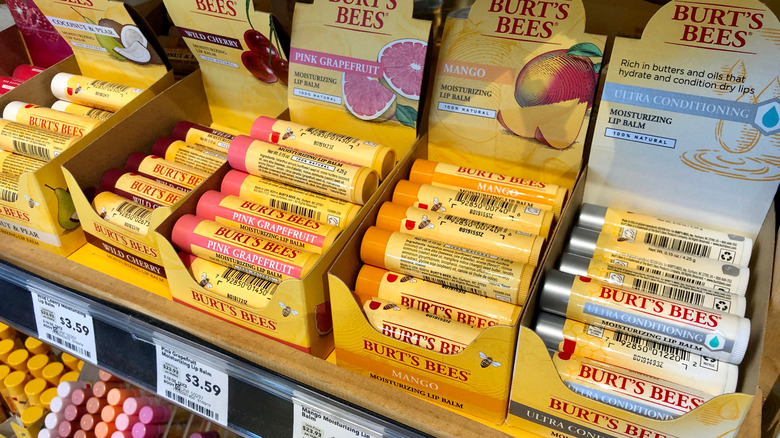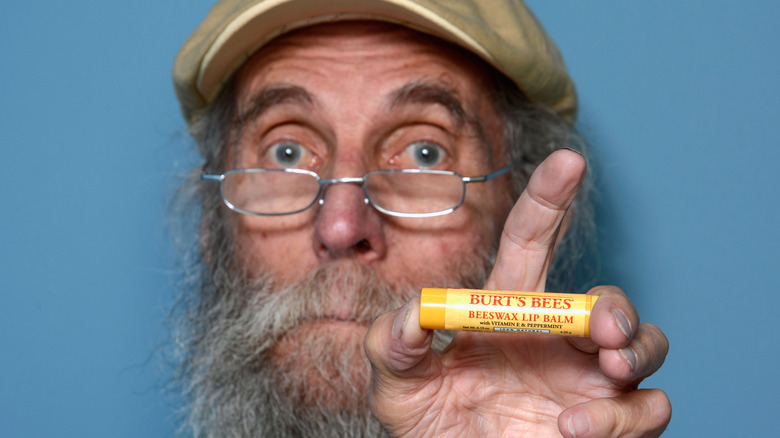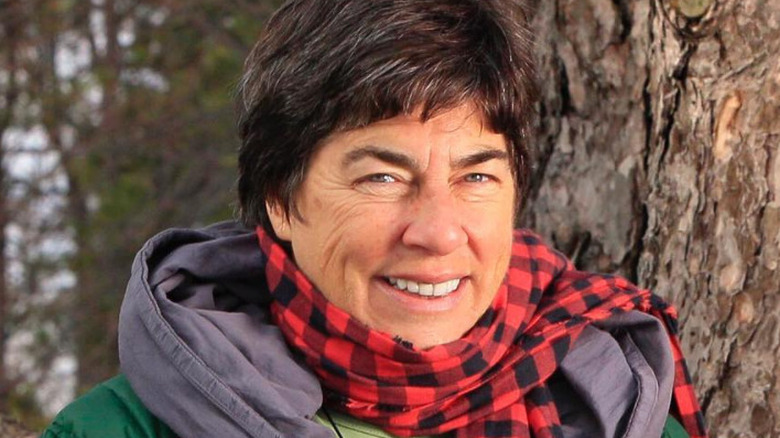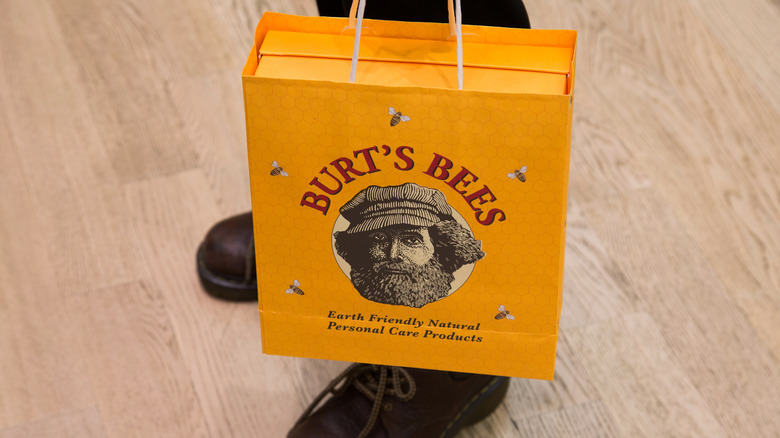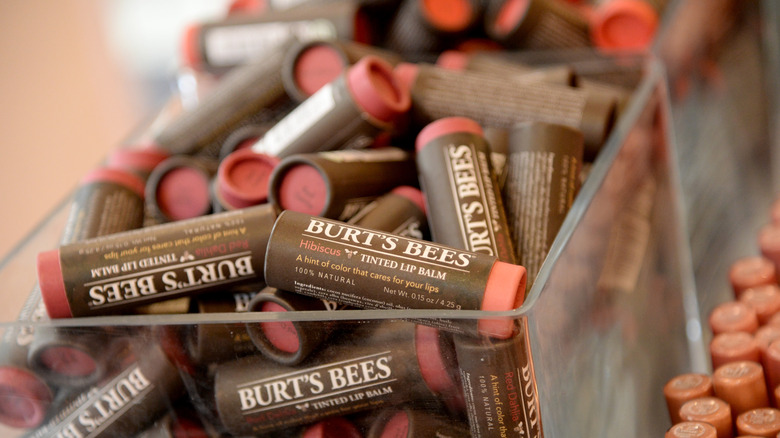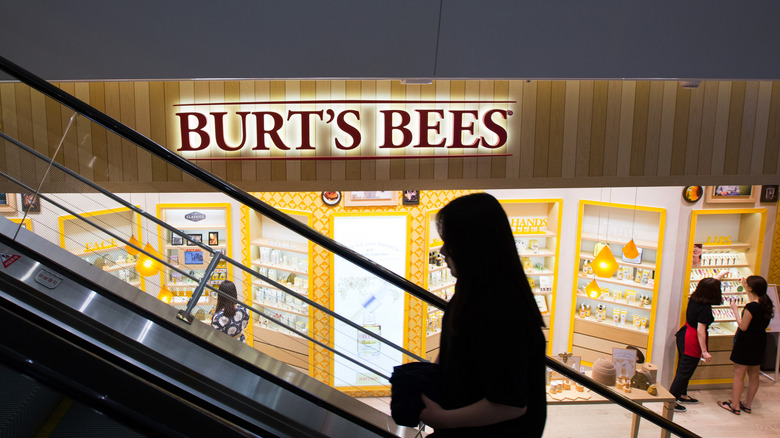The Untold Truth Of Burt's Bees
What does a candle maker hitching a ride from a beekeeper produce? Well in this story's case, a billion-dollar company and an internationally known beauty brand. That's right. According to Forbes, the natural beauty product company known as Burt's Bees started when co-founder and candlemaker Roxanne Quimby hitched a ride from fellow co-founder and bee keeper, Burt Shavitz. The two quickly discovered they could be a match made in hive heaven, both in love and in business. And after making $200 in one day from selling beeswax candles at an arts and crafts sale, Burt's Bees was born.
It's likely you have heard of this all-natural brand. As Esquire states, the company is currently worth over one billion dollars. The mustard yellow label has been producing all-natural makeup and skin care essentials even before consumers became drawn to the hype of green alternatives. The success of this story might be enough to make you consider taking up beekeeping as a side hustle. But before you quit your day job, know that these two founders were never in it for the surprising riches.
Both Quimby and Shavitz wanted to live a modest life
Roxanne Quimby, in fact, had completely rejected capitalism from an early age. "I had renounced the pursuit of capital as a radical 19-year-old in the 1960s," she says via Forbes, adding, "I was going to live without money. I didn't need it. I was going to trade and grow stuff and keep my expenses low." As for Shavitz, he had also grown tired of his job as a photojournalist in New York City in the 1960s. Esquire points out that although he was a successful and shot for The New York Times, Life, and Time, he decided to move to rural Maine to live a quiet life after receiving an inheritance from his grandfather who had passed away. Fast forward to the duo's meet cute in the mid 1980s, and then the unknowing couple started their business venture. And what's even more unique about this start-up's story is that their original products were anything but new.
Quimby looked into the past to produce a new product
Soon after the beeswax candles came shoe polish (via Esquire). And then eventually the infamous lip balm. "One of our first personal care products was lip balm," shares Quimby via Forbes. She goes on to say she found the original recipe in a 19th-century book on personal care. "We were just searching for ways to use beeswax, beyond just the candle... It just took one step after the next," she says. "Our sales started to grow with the lip balm, so we thought there was some opportunity there: Let's make a moisturizing cream, let's make a foot cream."
It appears the company's list of products grew as naturally as the ingredients they were made from. The couple grew their business throughout the next decade. But romantically, they were stung. According to The New York Times, the couple split in 1993. Esquire claims the breakup was caused by an affair Shavitz was having. But whatever it was that made them officially split, it gave Quimby the queen bee role and more control over the company. And in 1999, she bought out her ex's share of Burt's Bees for $130,000.
Shavitz made peanuts in comparison to what Quimby got for the sale of Burt's Bees
The six-figure number may sound like a large sum. But it was peanuts compared to what Quimby brought into her own personal hive when she eventually sold Burt's Bees to the chemical giant Clorox for what Forbes claims was a $275-million payday. Luckily, Shavitz didn't appear to be miffed about selling his share of the company before his ex cashed in. "What happened between us in our personal relationship in the past is history," he said in a statement via The New York Times, adding, "The magic of living life for me is, and always has been, the magic of living on the land, not in the magic of money." He's also mused to The Daily Beast, "What do I need it for, millions of dollars? It just sounds like problems with the IRS to me." As for Shavitz's feelings about the all-natural Burt's Bees being bought out by a chemical company, very little is known, though he has been quoted in The New Yorker saying, "Except for the fact that they're from Clorox, they're nice people."
Burt's Bees employees get rewarded for being environmentally conscious
And Quimby has also made peace with Burt's Bees being in the hands of a chemical company. "I feel the fact that I was able to sell the company accelerated the process of land conservation in terms of what I could do," reveals Quimby via The New York Times. Adding, "So if there is any negative karma, I'm neutral." The land Quimby is talking about conserving is a reference to the thousands of acres she purchased across the U.S. with her buyout money. Her intent is to preserve and not develop, notes Forbes. And Quimby's intent appears to have been fulfilled. In 2016 she donated over 87,000 acres to the National Park Service.
According to The Daily Beast, Burt's Bees produces more than 120 skin and hair products today and appears to be doing well as a member of the Clorox family. Plus it still maintains some of its original green values. According to The New York Times, Burt's Bees employees receive bonuses based in part on how well the company meets energy conservation goals. And the best parking spaces are reserved for employees who drive hybrid cars or carpool.
The original co-founders birthed a billion-dollar business
As for the two original founders, life has come full circle, though in different ways. Today, Quimby lives on a farm filled with animals in Maine. "I've kind of gone full circle, and just came back to right where I was," she says to The New York Times. And Shavik, the original co-founder you still see on a multitude of Burt's Bees products, passed away in 2015. NPR claims the accidental entrepreneur was 80, and died as a result of respiratory complications.
And though the two co-founders didn't work out as a couple, it is clear they shared a similar love for the modest life. "I have a theory about really expensive things," Quimby says to Forbes. "You become a prisoner of them, and you have to lock your doors. Then you lose your key, so I just can't do that." Despite this shared philosophy, there are very few exes that can claim their relationship birthed a billion-dollar business from bees.

